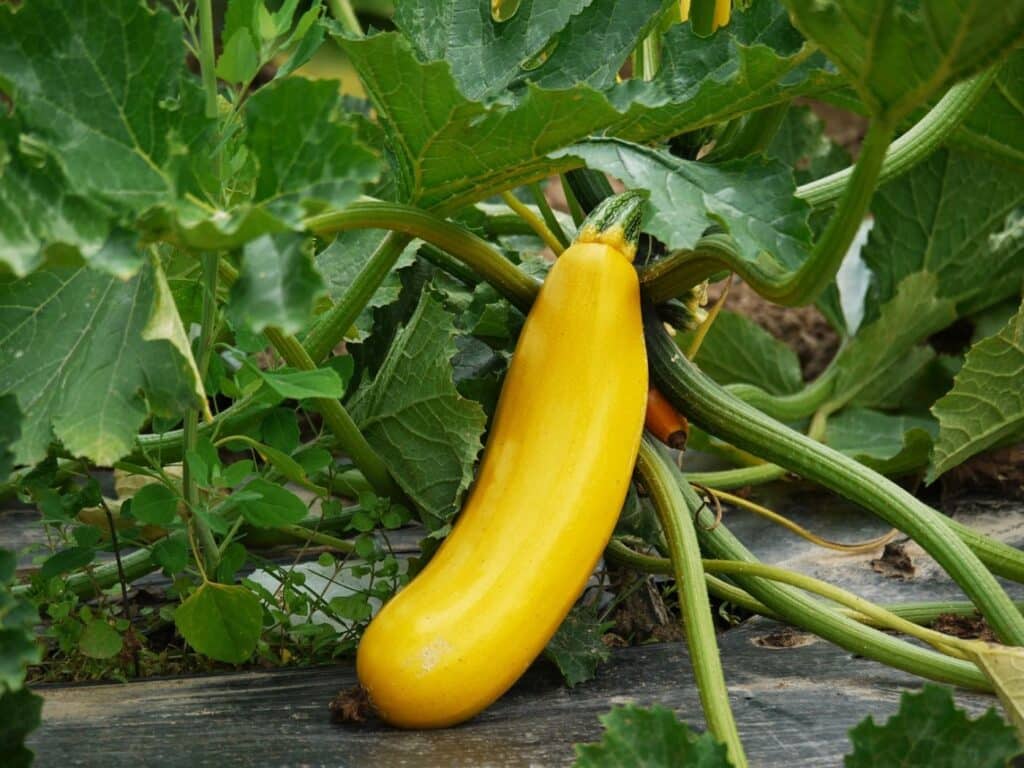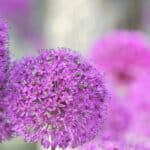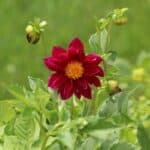Zucchini (Cucurbita pepo), also known as courgette and baby marrow, is a delicious squash that can be used to create all sorts of delicious salads, stews, or vegetable dishes. This healthy plant is an absolute must in every vegetable garden.
If you want a healthy harvest of zucchinis, pairing zucchinis with the right type of neighboring plants is very important. The right combination of plants in your garden will naturally deter pests, attract beneficial insects, and promote the growth of zucchinis.
There are quite a few different plants that can grow well alongside Zucchini. In this zucchini companion plant guide, we will look at some of the best zucchini companions to include in your squash garden bed.
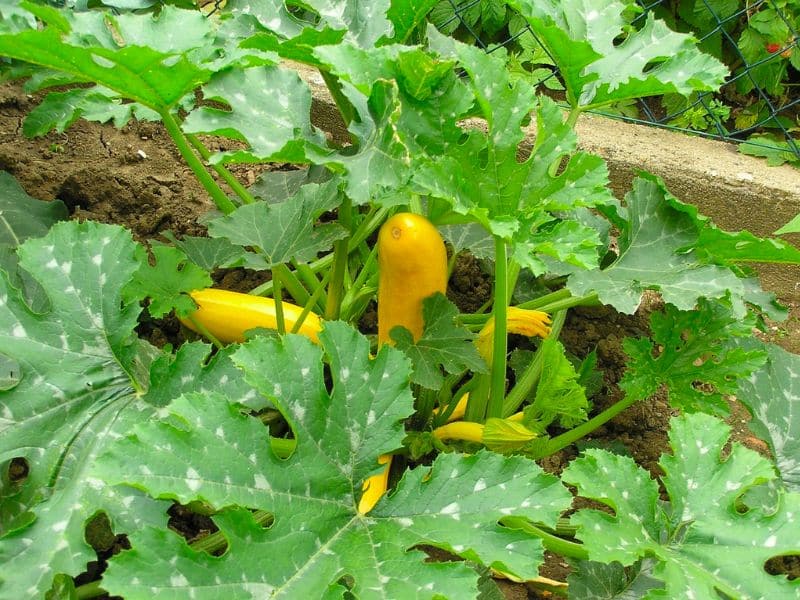
What to Plant with Zucchini
Pairing vegetable plants with the exact growing requirements is always good when selecting the right neighbors for your garden. These vegetable plants need plenty of sunlight, prefer moist soil or water, and fare best in nutrient-rich soils.
With Zucchini, the most important thing to remember is that these and most other squash plants, are heavy feeders. Zucchini foliage requires a lot of nutrients to grow healthy and to develop fruits. It is usually best to pair this type of vegetation with plants that restore nutrients in the soil.
It is also best to allow plenty of room around Zucchinis so they can sprawl and develop well and so there will be enough nutrients for other plants.
Let’s quickly look at some of the best companion plants to add to your garden.
The Overall Best Zucchini Companion Plants
Corn and legumes are the two best plants to add to your zucchini crop. These three plants are often called “the three sisters” because they grow so well together, and each has some characteristic that benefits the other two. These three vegetables are also very complimentary when you add them together in a broth, stew, roast, or soup.
The main benefit of zucchinis to the garden is that it acts as a living mulch. The zucchini plant can keep the soil nice and cool thanks to its dense foliage. At the same time, squash plants will deter pests like rodents because their stalks and leaves have plenty of spines that deter pests. The lush growth of squash also keeps other weeds at bay.
Legumes
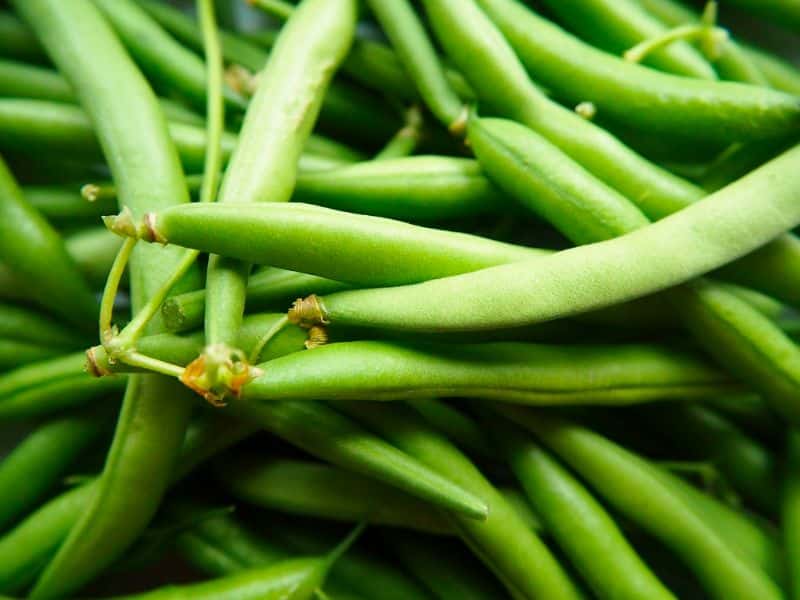
Legumes (Leguminosae) are one of the infamous “three sisters” and a must for any zucchini garden because these plants draw nitrogen from the air and deposit it into the soi. Legumes are ideal companions for any nutrient-hungry plant variety. While restoring the nitrogen levels in the soil, these plants will also feed your nutrient-hungry zucchini plants.
You can add any legume to your garden, including bush beans (Phaseolus Vulgaris), vine beans, and peas (Pisum sativum). Vine beans fix nitrogen just as well as any legume varieties, but we highly recommend this specific variety if you are growing all three sisters.
Legumes grow well in the same garden bed as squash plants because they enjoy moist soil and need plenty of sunlight to flourish and flower.
Corn
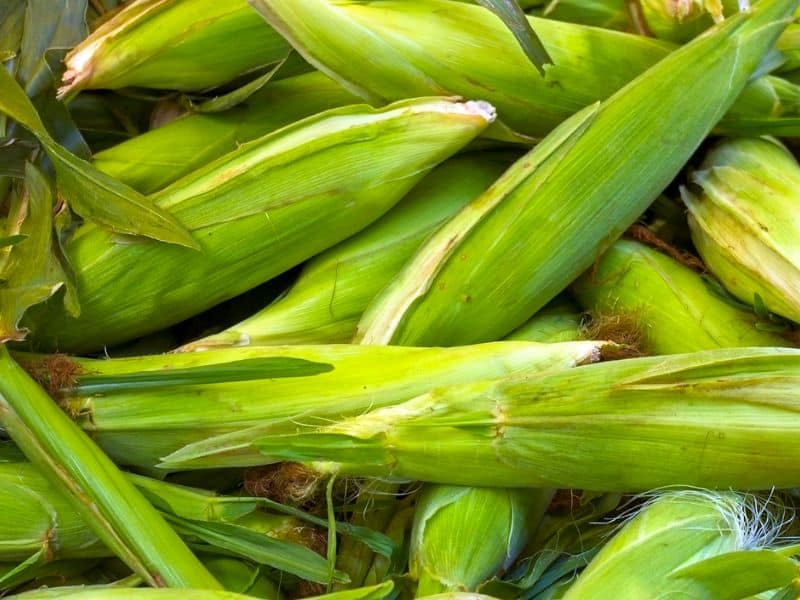
Corn (Zea mays), sometimes called maize, is another one of the “three sisters”. Corn, with its tall and sturdy stalks, is the perfect companion plant for vine beans because those tall stalks help strengthen the bean vines or pole beans and act as a trellis for this type of vegetation.
Corn can also be grown behind zucchini plants because they grow quite tall and won’t be bothered by the dense foilage of the squash growths that might obscure some of the sunlight.
Corn has the same basic growing requirement as squash plants. They enjoy lots of moisture, need limited nutrients, and enjoy plenty of sunlight. Just be careful to leave plenty of room between your corn and zucchini plants, or the Zucchini could end up pushing the corn stalks out of place.
Chamomile
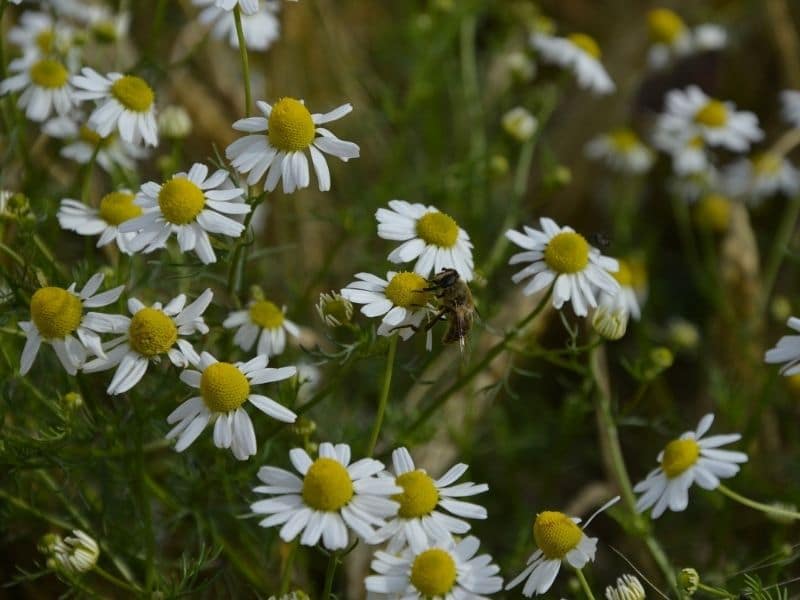
Chamomile (Matricaria chamomilla) isn’t one of the three sister plants. However, these annual herbs are still great for companion planting because they restore some of the soil’s chemicals and lure pollinators to your garden. The floral plant produces many delicate flowers that will make your vegetable garden look much more aesthetically pleasing.
German chamomile is often used as a flavoring agent for beverages and cosmetic products. It is beneficial for making herbal teas and is frequently used for its calming properties.
It is usually best to grow chamomile amongst your marrow plants to nourish the soil and promote the growth of zucchini plants. Chamomile grows very well in raised beds, containers, and gardeners. They enjoy lots of full-sun but can wilt if exposed to too much sun. Paired closely with these zucchini companion plants, the marrows will offer a little shade that chamomile might need to survive extreme heat conditions.
Best Zucchini Companions For Pest Control
Your zucchini seedlings or crop can easily fall victim to several pests like aphids, cucumber beetles, cutworms, leafminers, spider mites, and thrips.
There are quite a few vegetables and herb plants that you can add to your zucchini garden if you want to reduce garden pests without using toxic chemicals. Some plants attract beneficial insects that naturally deter pests, while others produce a scent that naturally repels certain damaging insects.
Here is a quick look at some of the best pest control plants to add to your garden.
Marigolds
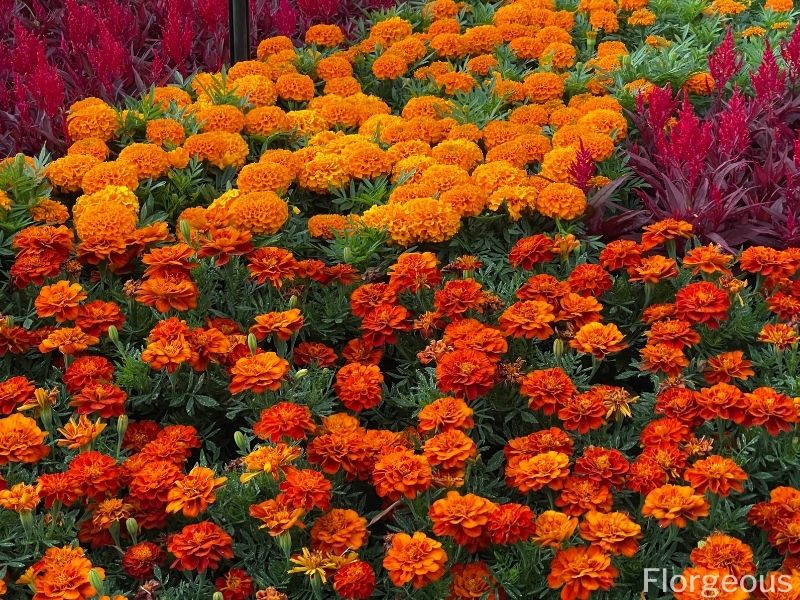
Marigold flowers (Tagetes) are ideal zucchini companion plants because they offer many benefits. The beautiful foliage with its bright orange or yellow flowers can create a cheerful and attractive look in your garden. These flowers will also attract beneficial insects such as honey bees or butterflies that will help pollinate your zucchini flowers.
Marigolds help reduce soil nematodes and lure many insect pests, such as aphids and squash vine borers, away from your vegetables because marigolds act as a sacrificial trap crop. The problems will feed on the marigolds instead of plaguing your vegetable garden. The floral plants also attract parasitic wasps that kill and feed on damaging zucchini pests.
When adding marigolds to your garden, you should take care to grow them in direct sunlight and keep them in a separate garden bed to reduce soil moisture. Unlike zucchini growths, these drought-tolerant plants are not too fond of excess water.
Borage Flowers
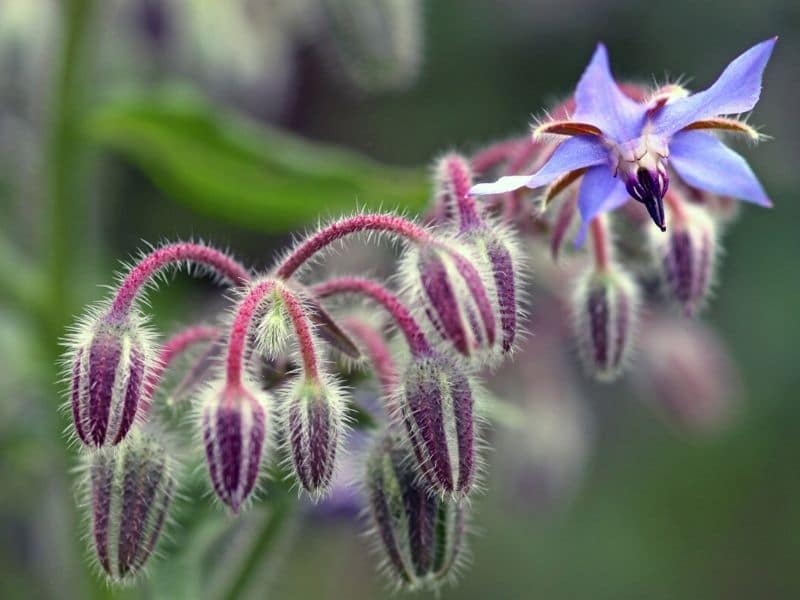
Borage (Borago officinalis) is another helpful pest repellant to add when you plant zucchini. This floral plant repels various damaging insects, and it will keep your garden mosquito-free. These valuable plants will also attract pollinators to your zucchini crops, which might boost your yields.
Borage is an excellent companion plant in a vegetable garden because it also restores soil nitrogen. It is usually best to grow borage relatively close to your zucchini plants so the zucchinis can benefit from borage’s nitrogen-fixing abilities.
When planting borage, try to add them between your zucchini plants. They usually reach 2 – 3 feet and won’t obscure too much sunlight to zucchinis. When you grow them amongst Zucchini, the borage will also act as a natural mulch that can keep the soil cool and moist.
Dill
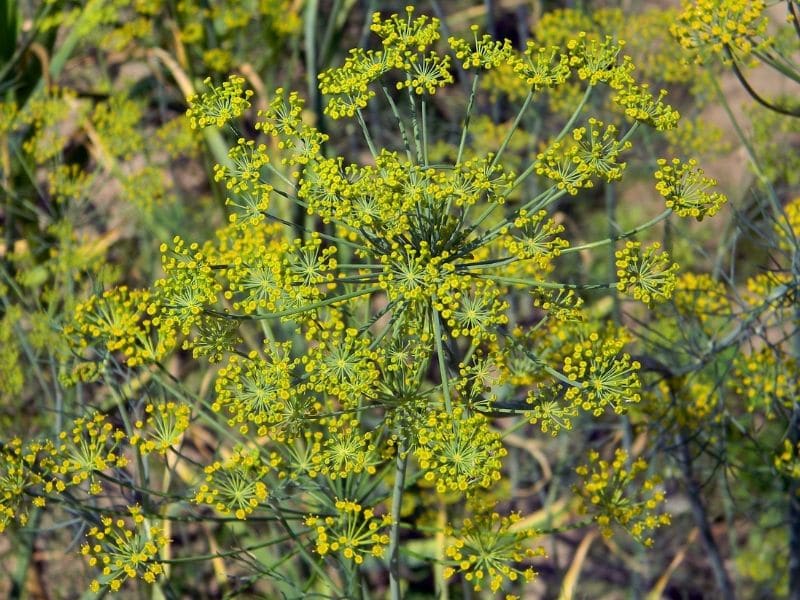
Dill (Anethum graveolens) is an aromatic plant with medicinal properties and can be used as a spice. The fragrant scent of this plant attracts pollinators like butterflies and bees. Bees pollinate zucchini flowers and increase your yields. At the same time, dill will attract other beneficial insects like ladybugs, lacewings, overflies, praying mantes, and wasps. Ladybugs love to feed on aphids, while other predatory insects do a great job at combating other pests.
The small flowers and young dill leaves are edible and can be used in salads or to brew herbal teas.
You can grow dill amongst your zucchini crop because these plants aren’t heavy feeders and grow well in lots of sunlight. Dill enjoyed well-draining soil, and the bushy plant isn’t too spacious, so it will be easy for your zucchini plants.
Garlic
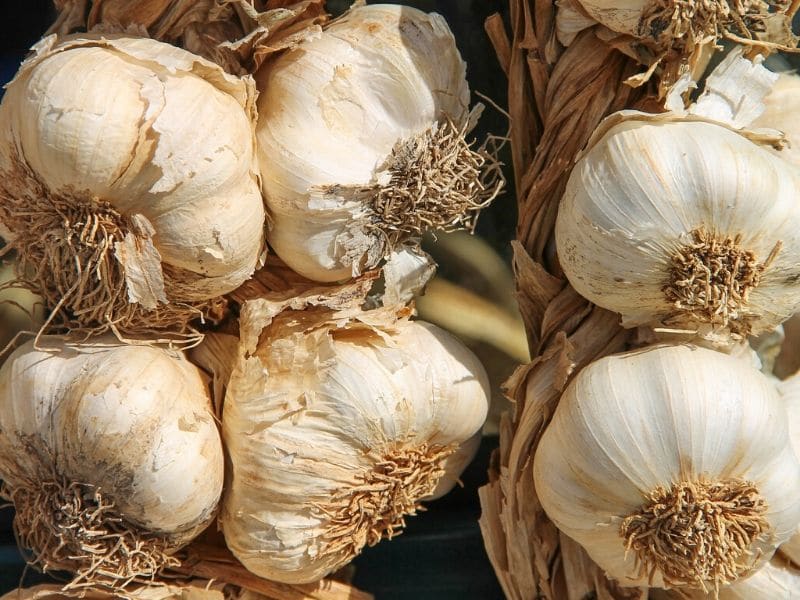
Garlic (Allium sativum) is also good for companion planting alongside just about any vegetable and should be included in every vegetable garden. The strong scent of garlic will repel all sorts of pests like aphids, spider mites, caterpillars, cutworms, beetles, slugs, and armyworms that might invade and attack your growths.
Garlic plants need a lot of sunlight and grow at a reasonable height. They can quickly become overshadowed by the bulky growth of squash plants. To keep your garlic vibrant and protect your garden, it is usually best to grow garlic in rows between zucchini rows or around your entire vegetable garden.
Best Zucchini Companion Plants for Attract Pollinators
The colorful flowers of zucchini plants often aren’t enough to attract pollinators to your garden. This can result in low yields even if your plants thrive. To boost your vegetable garden yields, it is always a good idea to add a couple of plants that will attract beneficial pollinators like honey bees and butterflies to your garden. Here is a quick look at some excellent companion plants to get lots of fresh baby marrows.
Lemon Balm
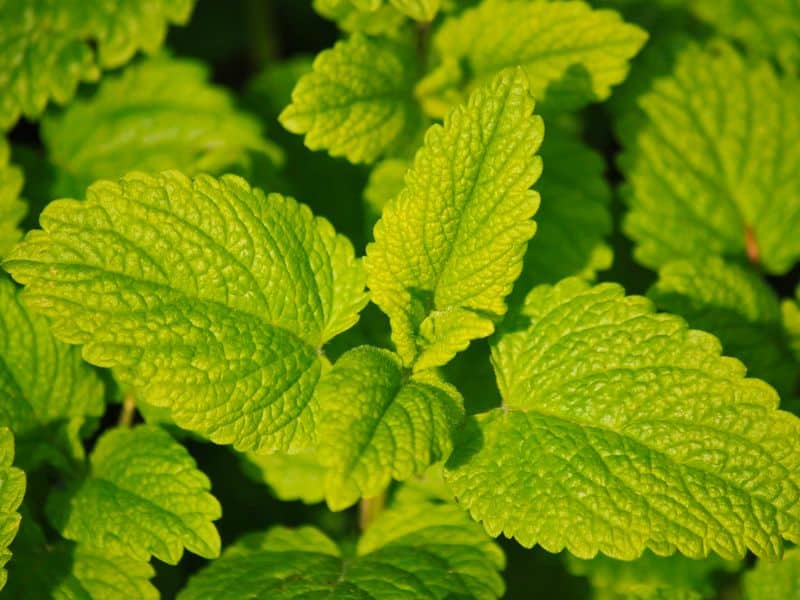
Lemon balm (Melissa officinalis) is an aromatic herb of the mint family that is often grown for its lemon-scented leaves. Lemon balm is an excellent zucchini companion plant because it attracts pollinators like bees that can help increase your yields. The strong scent of lemon balm is also helpful for repelling various damaging pests that do not like the scent of this fragrant plant.
These good companion plants will act as a ground cover to keep weeds from sprouting or to keep the moisture locked into the soil.
The balm can be grown amongst your zucchini plants because they don’t grow too tall and will benefit from the partial shade created by zucchini plant leaves. They grow well in well-drained soil but are not the most drought-tolerant plant species.
Catnip
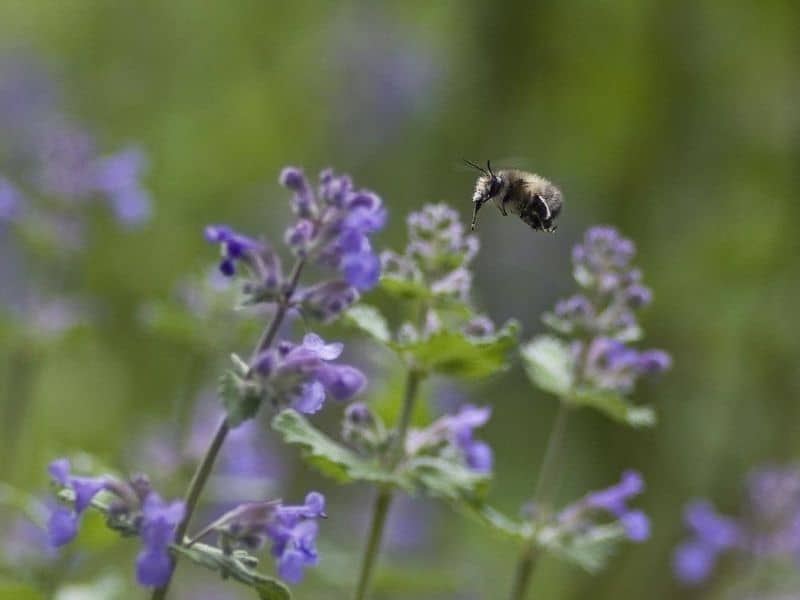
Catnip (Nepeta cataria) is one of the most beautiful herbs to add to your zucchini patch or alongside other squash cultivars. These fragrant plants produce small white and purple flowers that attract bees and other pollinators – as well as cats – to your garden.
Catnip is also useful for repelling aphids, ants, squash bugs, squash vine borers, rats, and other pests. You can also use catnip as a trap crop to keep cats and kittens from digging holes in your garden or from using your garden as a potty area because cats hardly ever venture past catnip lanes.
For optimal results, it is usually best to grow catnip around your zucchini patch. The herbs will act as a protective barrier that keeps pests at bay while luring all sorts of beneficial pollinators.
Related: Catnip Companion Plants
Nasturtiums
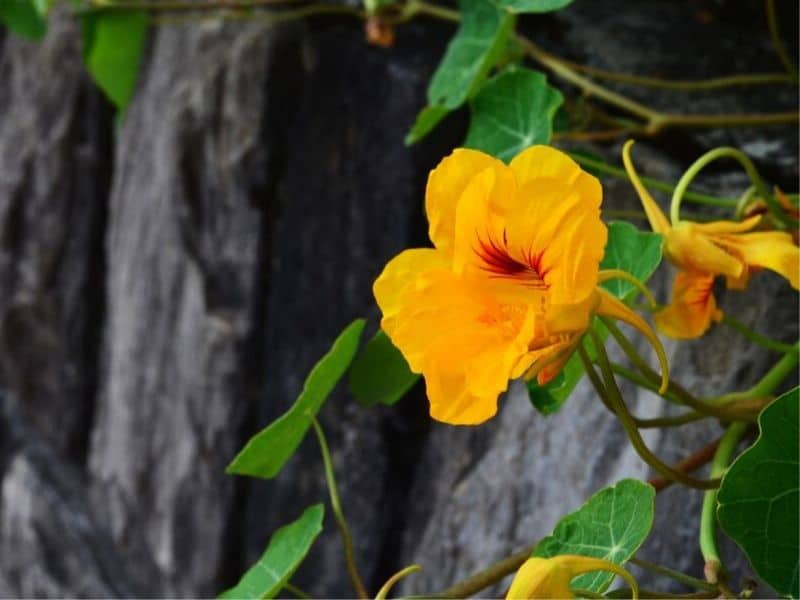
It is also good to add nasturtiums (Tropaeolum), also known as Indian cress, Mexican cress, nose-tweakers, and nose-twisters, to your garden because these edible plants will attract lots of pollinators and they are edible so you can use them to prepare salads or use them as a garnish.
Garden nasturtiums bloom throughout the season and will ensure a consistent stream of pollinators. This plant also acts as a trap crop and will draw pests like aphids and whiteflies away from your baby marrows and towards the nasturtiums.
For optimal effect, it is usually best to grow Nastriums around the perimeters of your garden. This way, the pests can be lured well away from zucchinis and other food crops and you can easily remove the nasturtiums should they become overrun with pests.
Worst Companion Plants for Zucchini
Not all plants can be grown alongside zucchini. Squash plants require lots of nutrients. If you plant zucchini alongside other plants that need lots of nutrients, you aren’t likely to see a successful harvest for any of your plants. Here is a quick look at some of the worst companion plants to add to a zucchini garden.
Cucumbers
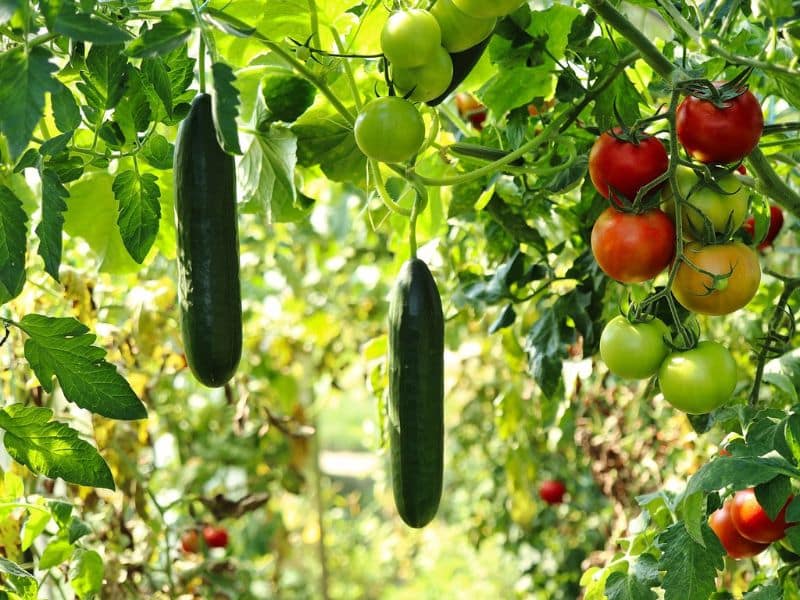
Cucumbers (Cucumis sativus) are not great companion plants because the huge vines of these plants can smother zucchinis. Cucumbers will also lure cucumber beetles into your garden which can also ruin your zucchini yields.
Related: Cucumber Companion Plants
Other Types of Squash and Pumpkins
You should avoid planting other types of squash varieties (Cucurbita) too close together. These vine plants usually take up a lot of garden space and can end up smothering zucchinis. Most squash varieties also need a lot of fertilizer and nutrients to grow. If you have a lot of nutrient-hungry plants in the same garden bed, the growth and development of these plants will be stunted.
Growing pumpkins alongside zucchini can also alter the taste of your fruits because cross-contamination can occur. This can result in very interesting produce but will make all the vegetables in your garden taste a lot different.
Potatoes
You should also avoid planting potatoes with zucchinis as well as most other squash varieties. Potatoes (Solanum tuberosum) are voracious feeders and will deprive your zucchinis of nutrients. Adding these plants alongside zucchini also increases the chance of getting paper blight and powdery mildew.
Fennel
This plant isn’t necessarily a poor companion plant for zucchini because fennel attracts beneficial insects. The only issue with fennel is that it can impede the growth of your zucchinis and just about every other plant in your garden.
If you want to add fennel (Foeniculum vulgare) to your garden then it is always best to keep this plant to the side or in a pot.
Final Thoughts
We hope that this guide helped you find a couple of great companion plants for your zucchini garden so that your vegetables can grow healthy and strong and produce lots of healthy baby marrows.
If you want to learn more bout companion plants for other types of vegetables and ornamental garden plants then we welcome you to have a look at some of our other guides. On our website, you can find the best growing tips and advice and your garden will flourish.
Up next:

